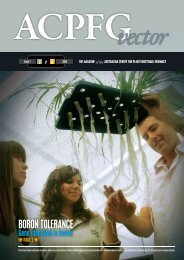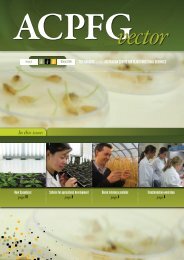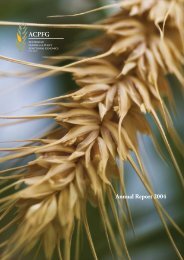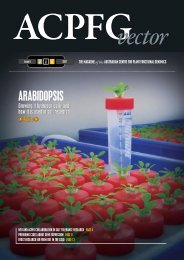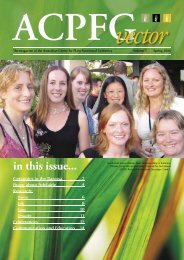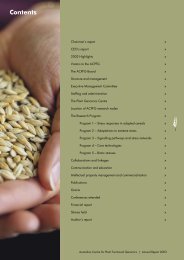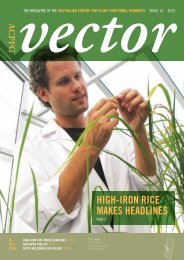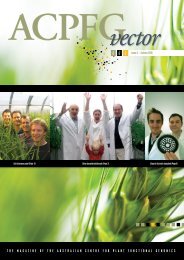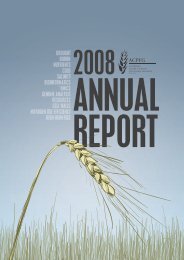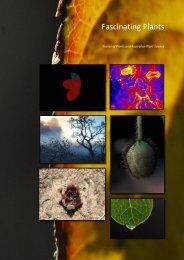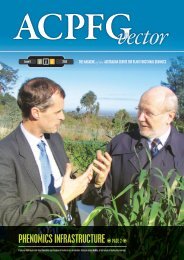ACPFG Annual Report
ACPFG Annual Report
ACPFG Annual Report
Create successful ePaper yourself
Turn your PDF publications into a flip-book with our unique Google optimized e-Paper software.
Transcriptomics<br />
transcriptomics<br />
DROUGHT<br />
Ute Baumann<br />
Ute Baumann completed her undergraduate studies in genetics at the University<br />
of Freiburg, Germany, then moved to Australia for a PhD in plant molecular biology<br />
at the University of Adelaide. She moved to the UK for a Postgraduate Certificate<br />
in Bioinformatics at the University of Manchester, before returning to Australia to<br />
work for <strong>ACPFG</strong>, where she leads bioinformatics at the Adelaide node and<br />
transcriptomics nationally.<br />
Background<br />
When plants are subjected to an abiotic stress they<br />
respond and adapt by altering the expression levels of<br />
hundreds of genes. These transcriptional changes cause<br />
adjustments of cellular, physiological and biochemical<br />
processes that have evolved to help plants cope with a<br />
range of environmental stresses.<br />
Global gene expression studies, or transcriptome analyses,<br />
can help unravel possible mechanisms of stress tolerance,<br />
and also provide insights into why some cultivars are more<br />
stress tolerant than others.<br />
Research and activities<br />
Transcriptomics research at <strong>ACPFG</strong> involves profiling the<br />
transcriptomes of cereal genotypes differing in their tolerance<br />
to various stresses, identifying candidate genes potentially<br />
involved in stress tolerance, and developing the <strong>ACPFG</strong>’s<br />
QPCR stress series. Our focus in 2007 was on the analysis of<br />
microarray data generated in 2006 and on the use of QPCR to<br />
confirm microarray results.<br />
Investigating salt and boron<br />
tolerance with microarrays<br />
In 2007 there were some exciting results. In rice, salt<br />
microarray data provided clues to why the rice cultivar FL478<br />
is salt-tolerant; this work is now being prepared for publication.<br />
Analysis of gene expression in barley grown under elevated<br />
levels of boron revealed a likely candidate for the 3H boron<br />
tolerance locus, and several candidates for the 2H boron<br />
tolerance locus that are currently under investigation.<br />
Investigating drought tolerance<br />
in wheat with microarrays<br />
The wheat drought stress experiment is part of <strong>ACPFG</strong>’s<br />
involvement in CGIAR’s Generation Challenge Project,<br />
Programme #15. The bioinformatics work involves comparative<br />
transcriptomics, specifically comparing the response of the<br />
wheat, maize and rice transcriptomes under drought stress.<br />
To achieve this, we firstly need to distinguish orthologues,<br />
paralogues and homeologues. No genome sequence is<br />
available for wheat and maize, so expressed sequence tag (EST)<br />
data from public sequence databases was used. The ESTs were<br />
clustered and assembled into consensus sequences, which<br />
were subsequently used for orthologue identification.<br />
In 2007 we worked with plant material grown and collected<br />
in 2006, in which one of the worst droughts in Australian<br />
history was recorded. Three wheat cultivars were used,<br />
namely the drought resistant cultivars Excalibur and RAC875,<br />
and the drought sensitive Kukri. We completed the microarray<br />
experiments for Excalibur leaf, and the remaining experiments<br />
will be completed in 2008. The microarray platform employed<br />
is the Wheat Long Oligo Chip, which was designed in an<br />
international collaboration in 2004.<br />
QPCR stress series<br />
<strong>ACPFG</strong>’s QPCR stress series is a collection of cDNA samples<br />
that allow scientists to rapidly examine transcript levels of<br />
specific genes in a range of tissues that have been exposed to<br />
different abiotic stresses.<br />
In 2007 we added a barley drought stress series and a wheat<br />
ABA stress series to our collection.<br />
32 2007 <strong>ACPFG</strong> ANNUAL REPORT



